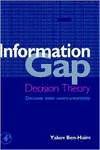
Information Gap Decision Theory: Decisions under Severe Uncertainty PDF
365 Pages·2001·17.433 MB·English
Most books are stored in the elastic cloud where traffic is expensive. For this reason, we have a limit on daily download.
Preview Information Gap Decision Theory: Decisions under Severe Uncertainty
Description:
Ben-Haim (mechanical engineering, Technion-Israel Institute of Technology) discusses the use of quantitative models and computational methods used for the formulation of decision algorithms and performance assessment in situations where the decision-making process is open-ended and characterized by a severe lack of information. Rejecting the current models of probability theory, he argues that a new theory (termed ''info-gap'' theory), which arose in the technological sciences, offers a methodology that takes into account the potentials of great success and great failure. The basic decision functions of the theory are the robustness function, which assesses the immunity to failure, and the opportunity function, which assesses the immunity to windfall. These concepts interact with functions of value judgments, gambling and risk-taking, value of information, assimilation of data, and coherent uncertainties to form the basics of info-gap theory.
See more
The list of books you might like
Most books are stored in the elastic cloud where traffic is expensive. For this reason, we have a limit on daily download.
